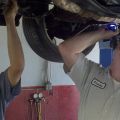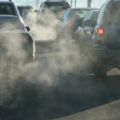Transmission Service
 Advanced Auto Repair of Denton, TX is your neighborhood transmission experts, and automotive maintenance specialist.
Advanced Auto Repair of Denton, TX is your neighborhood transmission experts, and automotive maintenance specialist.
Advanced Auto Repair of Denton, TX is your neighborhood transmission experts, and automotive maintenance specialist. Our ASE Certified Technicians will accurately diagnose your transmission problems, and provide you with an accurate estimate. We have seen problems range from a blown fuse to reprogramming the software in the TCM (transmission control module). Check out our coupons for additional savings. Call 940-382-1691 or click here to set an appointment.
Transmission problems can make anyone cringe. They can totally disable your vehicle and drain your bank account as well. That's why regular recommended transmission maintenance is critical!
Just a Quick Story
Recently, we received a vehicle towed in with a costly transmission problem. Unfortunately the owner of this vehicle was not a prior customer of ours. It seems he had heard a "clunking" noise and took it somewhere else to be checked out. They told him they checked it out, added some grease to a joint and sent him on his way saying "everything was just fine."
Three weeks later he was looking to trade this vehicle in and during the test drive the dealer said the transmission was starting to slip really bad. So the vehicle owner got in to go home (thinking the dealer was crazy) and guess what? he couldn't get it to go in reverse! So there he sat.
It's not only important to go to a reputable repair shop for your regular maintenance, but also for trouble shooting new noises and other potential problems.
What Should I Look For?
If you're experiencing any of the 6 problems listed below, it's imperative you have your transmission checked out right away. Why? Because transmission problems don't go away? they only get worse (and more expensive to fix)!
- Trouble shifting gears
- Transmission seems to be slipping
- Noise in the transmission (like a clunking sound)
- Transmission fluid leaking
- Check engine or transmission light is on
- Vehicle is inoperative (when you shift into gear - nothing happens)
What Can be Done to Prevent Transmission Problems?
1. Check your transmission fluid, or get it checked by a qualified service professional regularly (a good time to do this is when you're getting the oil & filter changed).
2. If your vehicle is getting up there in miles, then it may need more frequent transmission fluid changes than newer vehicles because of worn parts. More severe driving conditions also require transmission fluid changes more frequently. Such conditions include towing a trailer, overloading, and driving in temperatures above 90 degrees for extended periods, plus extensive stop-and-go driving.
3. Change your transmission fluid regularly. You can find more information in your vehicles owners' manual about the service schedule. The condition of the fluid determines how well it's cooling and lubricating all of your transmission's internal moving parts. Temperature control is crucial in keep your transmission shifting like it should. Overheating breaks fluid down so it loses its ability to protect these moving parts.
4. Check your driveway for leaks from your engine and transmission. Detecting a leak early may help you to avoid further damage to your transmission. The best method for finding leaks is to park your vehicle on a clean, clear spot. Keep it parked for 24 hours. Then start it up and allow it to run until it reaches normal operating temperature. Now move your vehicle and immediately check the ground for leaks. Transmission fluid is usually red, pink, or light brown as opposed to engine oil which will be brown or dark brown.
5. Check under your hood, for loose belts and cracked hoses. Loose or worn belts and hoses can cause your vehicle to overheat. Remember, high temperatures can damage your automatic transmission. Keeping your belts & hoses in good repair can save you from bigger trouble down the road (possibly leaving you stranded on the side of the road).
6. In stopped traffic (ex. waiting for a train), shift into neutral or park. For automatic transmissions, sitting still for long periods of time in Drive with your foot on the brake keeps your transmission engaged. It also puts your cooling system under added strain. By shifting into neutral or park the gear is no longer engaged and the transmission develops less heat.
NOTE: The most common failure of transmissions comes from excessive heat. This may come from your fluid breaking down from not being changed as recommended.
7. Shift into lower gear, if your vehicle is constantly changing gears. This means that you are in a gear that is too high for the terrain or load you are carrying.
A final reminder about transmission problems? they don't go away. They only get worse. What was once a minor repair at first often requires a major overhaul in just a short amount of time.
Other products and services:
Products and Services of other companies:
- +1 (940) 382-1691
- 612 Fort Worth Drive Denton, TX 76201
- www.advancedtireandrepair.com/






